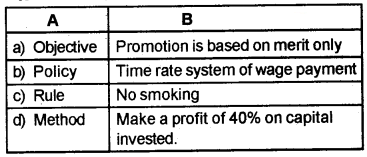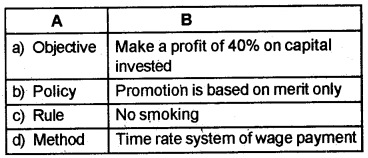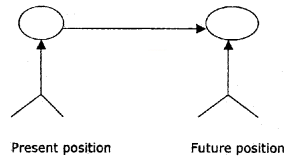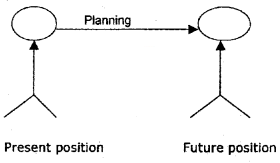Kerala Plus Two Business Studies Chapter Wise Questions and Answers Chapter 4 Planning
Plus Two Business Studies Planning One Mark Questions and Answers
Question 1.
Planning function is required to be performed by all managers at all levels. This feature of planning is
Answer:
Planning is pervasive.
Question 2.
When planning is reduced to black and white, it is known as
Answer:
Formal planning.
Question 3.
Operational plan is undertaken at
Answer:
Lower level management.
Question 4.
Plans are intended to be used repeatedly
Answer:
Standing Plans.
Question 5.
Is a plan which states the expected results of a given future period in numerical terms.
Answer:
Budget.
Question 6.
Which function of management is considered as the base of all other functions?
Answer:
Planning.
Question 7.
Identify the management function which insists on ‘thinking before doing’.
Answer:
Planning.
Question 8.
“These are assumptions on the basis of which plans are formed”. Find the appropriate term used to denote this.
Answer:
Planning premises.
Question 9.
I am a general statement and i provide guidelines in decision making to members of an organization. Who am i?
(a) Procedure
(b) Rule
(c) Policies
(d) Project
Answer:
(c) Policies
Question 10.
‘Mobile phones are restricted in schools’. What type of plan is this? (Method, Programme, Rule, Policy)
Answer:
Rule.
Question 11.
Find out the correct pair.
(a) Objective – Promotion is based on merit only
(b) Policy – Time rate system of wage payment
(c) Rule – No smoking
(d) Method – Make a profit of 40% on capital invested
Answer:
(c) Rule – No smoking
Question 12.
The management of Arun Industries decided to implement the following with effect from the year2007 – “Every employees should mark their attendance before 8 am”. Which aspect of planning is referred here?
Answer:
Rule.
Question 13.
State the type of plan involved in the following two sentences.
- Promotion is based on merit only
- Smoking is prohibited in the factory premises.
Answer:
- Policy
- Rule
Question 14.
“We sell goods only on cash basis.” Which type of plan is mentioned here?
Answer:
Policy.
Question 15.
Select an example each of objecvitves, goals and policies from the following plans.
- Increase sales by 10%
- Every employee should mark attendance before 10 a.m.
- Maximise the profit.
Answer:
- Objective
- Rule
- Objective
Question 16.
‘Offering 30% of jobs to women.’ What type of plan is it?
Answer:
Policy.
Question 17.
Name the type of plan which provides a basis for interpreting the strategy.
Answer:
Policies.
Question 18.
Name the type of plan in which the minutest details are worked out, that is procedures, rule and budget within the broad framework of policy.
Answer:
Programme.
Question 19.
Name the type of plan which is also a control device from which deviation can be taken care of
Answer:
Budget.
Question 20.
Sony electronics decides to sell television sets through exchange of old television sets. What type of plan is it?
Answer:
Strategy.
Question 21.
Which plan suggests acts and non-action of employees?
Answer:
Rules.
Question 22.
Detect the differences in the following statements contained in a firm’s plan.
- We sell goods only on Cash basis
- Smoking is prohibited in the factory Premises.
Answer:
- Policy
- Rule
Question 23.
Which among the following is not a limitation of planning?
(a) It reduces flexibility
(b) It is futuristic
(c) Does not guarantee success
(d) Planning is pervasive
i) a&b ii) b&d iii) a, b&d iv)c
Answer:
(ii) b&d
Question 24.
Match the following.

Answer:
a – ii
b – v
c – i
d – iii
Question 25.
Classify the following as single use plan and standing plan.
Budget, Method, Rule, Programmes, Procedure & Policies
Answer:
1. Single use Plan
Budget, Programme.
2. Standing Plan
Method, Rule, Procedure, Policies.
Plus Two Business Studies Planning Two Mark Questions and Answers
Question 1.
What is planning?
Answer:
Planning – Meaning:
Planning is deciding in advance what to do and how to do. It is one of the basic managerial functions. Planning is closely connected with creativity and innovation. Planning involves setting objectives and developing appropriate courses of action to achieve these objectives.
Question 2.
State any two consequences if there was no planning.
Answer:
- If there was no planning employees would be working in different directions.
- The management would not be able to achieve.
Plus Two Business Studies Planning Three Mark Questions and Answers
Question 1.
In a classroom discussion, Kalesh argued that planning is a function to be performed only at top-level management. But Suresh is of the opinion that planning is required at all levels of management.
- Do you support the argument of Kalesh or Suresh?
- Justify your answer
Answer:
1. support the argument of Suresh
2.Planning function is required to be performed by the managers at all levels. Board of Directors plan at top level, Functional managers at departmental level and foreman at lower level. The degree and importance of planning depend on the level at which it is undertaken.
Question 2.
“Planning is needed in every function and at every level”. Explain.
Answer:
Planning function is required to be performed by the managers at all levels. Board of Directors plan at top level, Functional managers at departmental level and foreman at plant level. The degree and importance of planning depend on the level at which it is undertaken.
Question 3.
Planning is not a guarantee of success of a business. Comment.
Answer:
It is right to say that planning is not a guarantee of success of business. Since it based on assumptions regarding future and assumptions cannot be hundred percent accurate.
Question 4.
How does planning help in co-ordination?
Answer:
Planning makes co-ordination of various activities, departments and groups relatively easy. Co-ordination of departmental operations is facilitated by planning through the establishment of common goals.
Plus Two Business Studies Planning Four Mark Questions and Answers
Question 1.
“Planning is a continuous process”.
- Do you agree?
- Explain
Answer:
1. Yes.
2. Planning is an ongoing and dynamic process. Business environment undergoes constant changes and accordingly, plans have to be modified. The completion of one plan requires the other plan to be undertaken. Hence planning is a never-ending activity.
Question 2.
Match the following.

Answer:

Question 3.
What do you mean by “Single Use Plan” and “Standing Plan”?
Answer:
Types of Plans
1. Single-use plan:
A single-use plan is developed for a one-time event or project. Such plans are not to be repeated in future. E.g. budgets, programmes, projects, etc.
2. Standing plan:
A standing plan is used for activities that occur regularly over a period of time. E .g. policies, procedures, methods and rules.
Plus Two Business Studies Planning Five Mark Questions and Answers
Question 1.
“Forecasting is the essence of planning.”
- Do you agree?
- Explain.
Answer:
1. Yes.
2. Forecasting is the essence of planning. Forecasting involves assessing the future. Forecasting is a process of predicting relevant future situations that are likely to affect the activities of the organisation. Customer’s demand, competition, government policies, etc. can be assessed through forecasting. Forecasting helps an organisation to prepare plan efficiently and effectively.
Question 2.
- Explain the following diagram and identify the management function.
- Explain its features.

Answer:
1. management function.

2. Features of planning:
- Planning is goal oriented
- It is the primary function of management
- It is required at all levels of management
- Planning is a continuous process
- Planning is futuristic (forward looking)
- It is a decision making function
- It is a mental process
Question 3.
The Board of Directors of Karunya Ltd. decided to implement the following plans in their personnel department during the year 2006.
- Filling up the vacancies through promotion
- Selection of workers through various tests such as aptitude test, trade test, interview, etc.
- Newly selected workers should be given two weeks apprenticeship training.
- All employees should mark their attendance before 8 am.
- Increase production of a product by 10% in the year 2018-19.
You are required to
- Classify the plans adopted by Karunya Ltd.
- Establish the reasons for such classification.
Answer:
- Policy – Guide in decision making
- Procedure – Manner in which activities are performed
- Programmes – All activities necessary for achieving a given objective
- Rules – Rule is a rigid policy which cannot be altered.
- Objective – Target to be achieved.
Question 4.
“Planning, the primary function of management, suffers from a number of limitations.” Elucidate.
Answer:
Limitations of Planning
- Planning makes the activities rigid.
- Long term plans are insignificant in the rapidly changing business environment.
- It reduces creativity.
- It involves cost.
- It involves a lot of time.
- Planning does not guarantee success.
Plus Two Business Studies Planning Eight Mark Questions and Answers
Question 1.
“No enterprise can achieve its objectives without systematic planning.”
- Do you agree with this statement?
- Give reasons in support of your answer.
Answer:
Importance of Planning
1. Planning provides directions:
By stating in advance how work is to be done planning provides direction for all actions.
2. Planning reduces the risk of uncertainty:
Planning enables an organisation to predict future events and prepare to face unexpected events.
3. Planning reduces wasteful activities:
Planning serves as the basis of co-ordinating the activities and efforts of different departments and individuals. It helps to eliminate useless and redundant activities.
4. Planning promotes innovative ideas:
Since planning is thinking in advance, there is scope for finding better and different methods to achieve the desired objectives.
5. Planning facilitates decision making:
Planning helps in decision making by selecting the best alternative among the various alternatives.
6. Facilitates control:
Planning provides the basis for control. Planning specifies the standard with which the actual performance is compared to find out deviation and taking corrective action.
Question 2.
Briefly explain the steps in planning.
Answer:
Planning Process (Steps in Planning)
1. Setting Objectives:
The first step in planning
2. Developing premises:
Planning is based on certain assumptions about the future. These assumptions are called planning premises. Forecasting is important in developing planning premises.
3. Identifying alternative courses of action:
The next step in planning is to identify the alternative courses of action to achieve the objectives.
4. Evaluating alternative Courses:
The pros and cons of various alternatives must be evaluated in terms of their expected cost and benefits.
5. Selecting an alternative:
After evaluating the alternatives the manager will select that alternative which gives maximum benefit at minimum cost.
6. Implement the plan:
Implementation of a plan means putting plans, into action so as to achieve the objectives of the business.
7. Follow up action:
Plans are to be evaluated regularly to check whether they are being implemented and activities are performed according to schedule.
